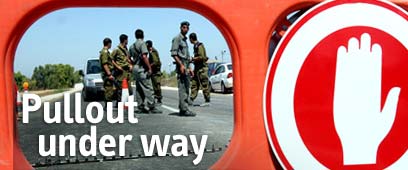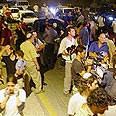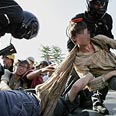


GAZA - Police and IDF troops forced open the Kissufim crossing in the Gaza Strip early Thursday, evacuating hundreds of anti-pullout protesters who had blocked the crossing and denied requests to disperse peacefully.
As a result, several clashes erupted between protesters and the security forces, resulting in a female police officer sustaining light injuries. She was evacuated to a nearby army base for medical treatment.
In addition, several protesters were lightly injured.
IDF Southern Command Head Dan Harel said following the IDF clearing of the area, that Wednesday’s protest was a provocation caused by settlers, which led to disorderly conduct, disruption of traffic routes and suffering for many residents.
Furthermore, Harel said the security forces had waited a long time before taking action to clear the area, in an attempt to refrain from using force.
“Next week we will use our judgment too,” he said.
A combined effort
One senior IDF officer told Ynet troops had acted with sensitivity.
“Let’s not forget this was the first clash of the disengagement plan,” he said. “The settlers must not expect the same treatment next Thursday, when “D Day” is expected to come to the Kissufim crossing.”
Southern District Police Commander Uri Bar-Lev said Thursday's evacuation was carried out professionally with sensitivity and decisiveness.
“We worked together with Border Police and the IDF in order to evacuate the intersection and prevent continual suffering for the residents,” he said.
In addition, Gaza Beach Regional Council Head Avner Shimoni told Ynet, the council had requested a violent clash between the police and anti-pullout supporters be avoided.
“Unfortunately, it failed,” he said. “Perhaps the police officers were too firm.”
Gaza's 'selective closure'
About 60 vehicles arrived at an IDF checkpoint in Kissufim Wednesday evening in order to block off the main road to Gush Katif.
The settlers honked their horns and refused to present identity cards to security personnel, as part of a protest against the police’s “selective closure” of Gaza.
Some of the demonstrators came from Gush Katif, and joined up with orange (color used by pullout opponents) protestors from Judea, Samaria, and other areas in the country.
Security forces did not allow the orange protestors into Gush Katif, as part of Gaza’s closure today and conversion into a closed military zone.
“Why don’t you let us enter, this is our country,” said an elderly man adorned with orange ribbons.
“Entry is permitted to residents only,” a police superintendent told the protestor.
'Justice in the world to come'
“You will face justice for this in the world to come,” called out one of the settlers.
“In the meantime though, you’re not coming in,” a young female police officer told him.
Yesha spokeswoman Emily Amrosi told ynet that the protest was the result of sporadic action by members of the public, who decided to act.
“We didn’t organize this. We sent thousands of text messages to our subscribers, telling them that the order for the main protest will go out on Monday. We don’t want to waste energy in confrontations until then,” said Amrosi.
‘Our home feels like a prison’
Naga Cohen, a 36-year old teacher, and mother of eight children, spoke about the closure of Gaza. “I’m supposed to be having guests on Friday evening and now I don’t know what to do. There’s also a bar mitzvah in the town, and they don’t know what will be with that. It’s unbelievable that they would close Gush Katif now. I feel like I’m in prison, its horrific. My husband returned home today after two days away, it took him half an hour to get through.”
“When they close the settlement because of terror attacks its annoying, but life is hard here. But now my government has closed it. That’s what absurd about this.”
“The closing of the Gush reminds me of a ghetto. Also, the way its being handled is immoral and lacks compassion. Fish processed in Eilat and animals in the safari receive more warning,” said Esher Mevatzri, 48, and father of seven, from Kfar Darom in Gush Katif.
“There are farmers here who are marketing produce, there are people enjoying life here. People here expect visits. We had no opportunity to prepare for this,” said Mevartzri.
“We feel that there has been a blow dealt to the unity of Israel. Ironically, its those who stood against the terror and the shelling who are paying a heavy price and are suffering. They have betrayed and abandoned us. We were reminded today of Jonathan Pollard, who rescued Israel from serious danger, and today Israel does not work for his release.”
-Inbal Ben-Sheetrit contributed to this report















